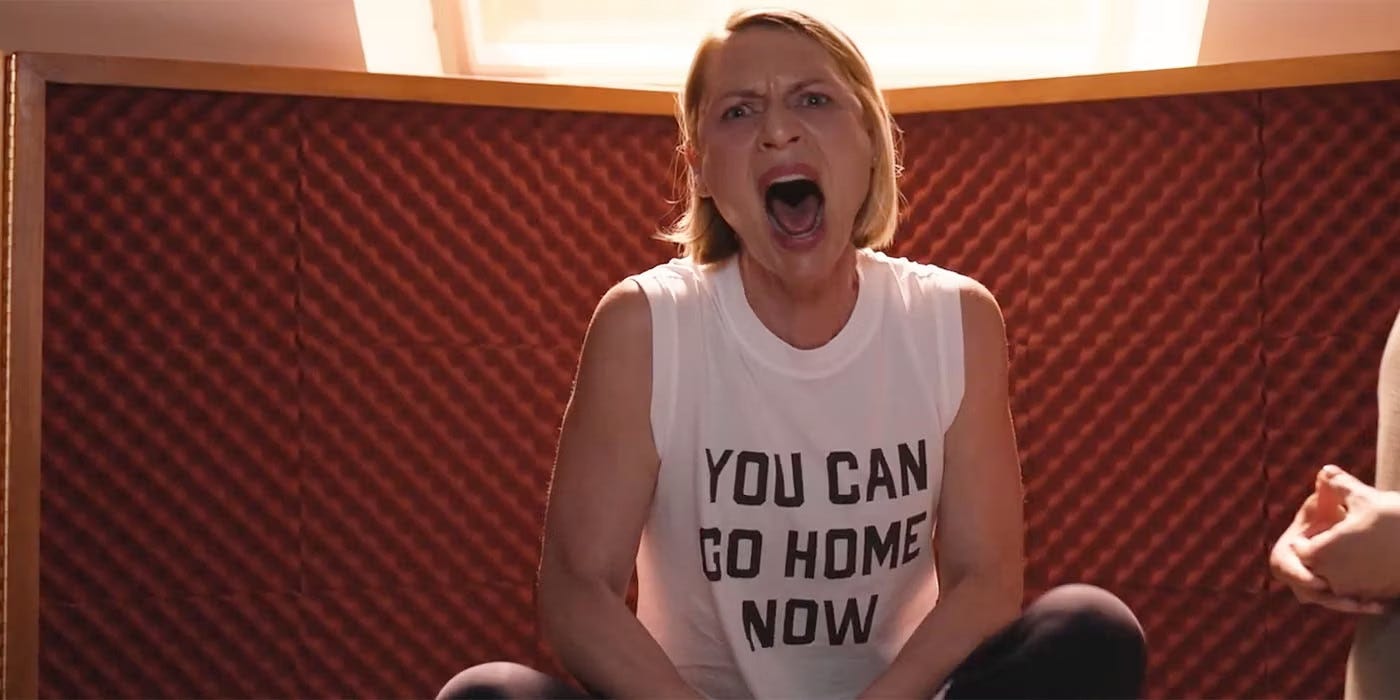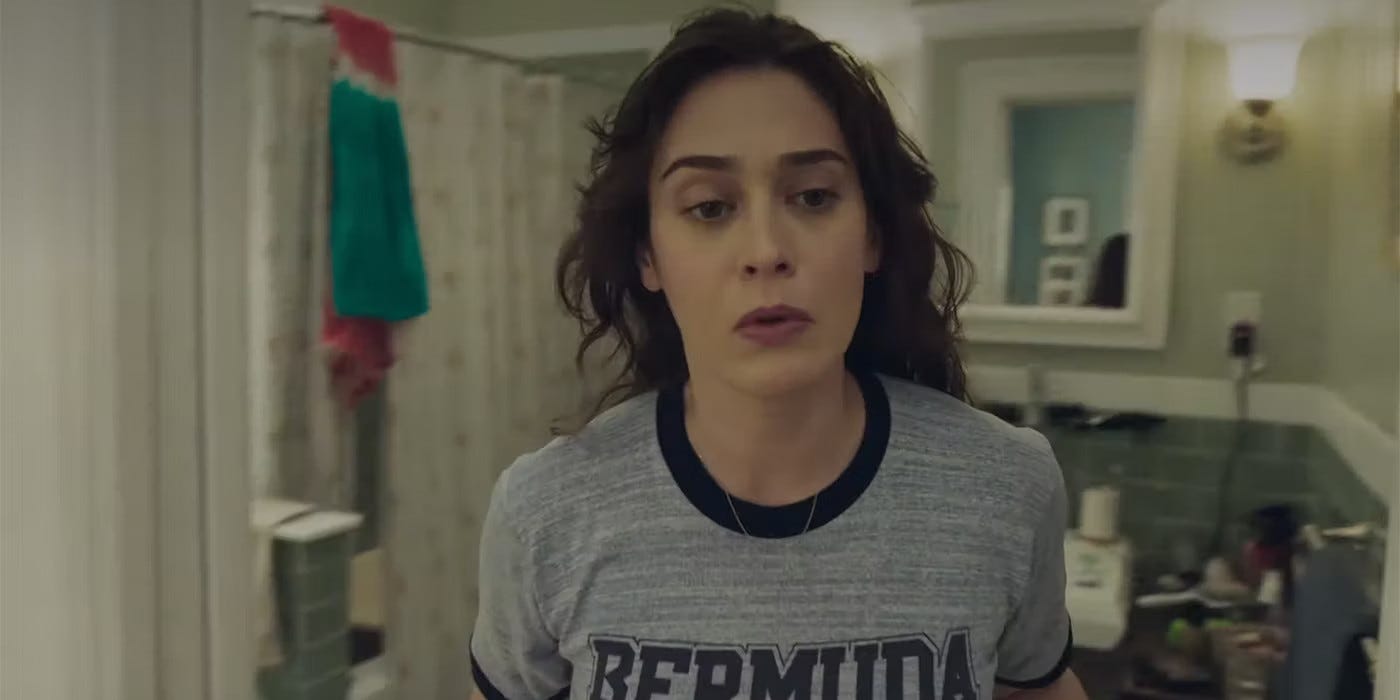Fleishman Is in Trouble by Taffy Brodesser-Akner is a good story (and this essay is mostly concerned with the television adaptation). It’s ostensibly about a 40-ish doctor, Toby Fleishman, whose former wife (and mother to their 2 kids) Rachel simply vanishes one day. She’s not kidnapped, or killed. She simply drops the kids off and never comes back to pick them up1.
One of the smart things Brodesser-Akner does in the story is tie it to Toby’s point of view for a long time, despite the fact that it’s narrated by Toby’s old college friend Libby. This dual layer of narration and point of view pulls off an impressive trick2: It allows Brodesser-Akner to constrict the information the reader gets in the first half of the book to Toby’s self-centered, angry point-of-view3 without seeming to, because Libby’s arch voice gives us permission to side with Toby even though he’s a bit of an asshole.
Authors have total control over us when we’re reading their story, and it’s worth remembering this: Brodesser-Akner gets to decide what we know about Toby, Rachel, and Libby, and this allows her to play a trick on us. We align ourselves with Toby because it seems like he’s the protagonist, and we’re trained to side with the protagonist. But it’s a trick, because Libby is the protagonist. Toby’s story only matters because it’s how Libby navigates her own midlife crisis4.
Which is weird, because if there’s one takeaway from Fleishman Is in Trouble it’s that women should stop wanting to be the protagonist.
There’s My Wife
Fleishman Is in Trouble is a relatively complex look at modern relationships and gender roles. Toby Fleishman argues with his wife about money a lot, because she appears obsessed with matching lifestyles with their uber-wealthy friends while he is content to be merely normal wealthy as a successful doctor5. Rachel experiences a horrific violation when in labor with their first child, and plunges into a desperate, black depression as a result. She finds some succor with a sexual assault support group, but when she encounters the doctor who assaulted her and sees that he has not only experienced zero side effects but doesn’t even seem to remember her, she snaps and pours herself into her work in order to prove that she’s not broken.
Toby’ reaction to this is ostensibly supportive—he urges Rachel to seek therapy and is perfomatively patient with her. But underneath it all, he’s not patient at all—he wants Rachel to get over it. He wants her to become the girl he fell in love with, the younger version who loved long walks and thought he was brilliant6. When Rachel returns from her group session and is softened by the catharsis of being able to scream and weep and be understood, Toby’s reaction is smug satisfaction: Finally, he thinks, he’s getting his wife back. Because her journey doesn’t matter to him. It only matters how her journey is affecting him.
So when Rachel, post-divorce, vanishes, Toby is all self-righteous rage. He has never attempted to truly understand his wife and what she was going through, and has lived for years under the firm belief that he was the Nice Guy in the relationship, cruelly and badly treated7. Rachel’s disappearance gives him permission to lash out, and he never once expresses a moment of doubt that he might not be right. Meanwhile, Rachel has had a nervous breakdown, something Toby is less than interested in when he finally learns the truth—that his wife didn’t abandon her family so much as collapse under the weight of a trauma she’s never quite dealt with, a trauma he couldn’t wait for her to get over so he could have his wife back.
Meanwhile, In New Jersey
Meanwhile, as the story advances Libby slowly emerges as more than a narrator but as a key character herself. In parallel to Rachel, Libby has been having her own crisis. She clung to a magazine writing job for years despite being stalled and dismissed in vital ways by her male colleagues. She got married, had kids, and moved to New Jersey8, but fantasizes about her life as a young woman of endless potential in New York9. When she and Toby reconnect in the wake of his divorce, she indulges in the fantasy that she could be that girl again—young and free and with nothing but time to burn while she makes her mark on the world.
When Libby literally crawls back into bed with her increasingly annoyed husband at the end of the story, he expresses an assessment of her recent tribulations (which he has endured with undisguised impatience and disdain) that is similar in smugness to Toby’s. He essentially says that he knew she would eventually come home, that her unhappiness and longing for something more was, in essence a phase10.
What’s fascinating about this is how the husbands are presented as flawed heroes, and their wives as flawed villains. While Toby certainly isn’t perfect—he’s acknowledged to be a bit self-centered and to have a temper—he’s also the one holding his family together, the one who doesn’t indulge his own needs to the exclusion of his family’s. When Rachel and Libby finally do return home, the implication is that they are finally doing the right thing, finally falling into line. And the implication is that the husbands, who have done nothing but scowl and complain about the emotional, professional, and spiritual crises their wives are going through, are in the right11.
Brodesser-Akner does a very good job of working through the subtle ways that men get to set the parameters of these stories. She pulls the audience in and makes us complicit with Toby’s shitty selfishness because she weaponizes our tendency to align with protagonists—we see Rachel through Toby’s eyes until the end, and then we get the eye-opening other side of the story, and it’s a powerful effect. Which makes the ending doubly weird, because she seems to undermine her own point by also aligning with Toby. The wayward women come home, apologetic and meek. The flawed men magnanimously accept them12. The end.
In other words, Toby’s not the protagonist here—he’s the antagonist. And the way he escapes all punishment for generally being a bad friend, husband, and father is ultimately the point: The women can rage and struggle all they want, they can be as successful as their talents will let them, but in the end they are the ones crawling into bed and begging forgiveness13.
Next week: Entering the Lasso-verse
To be fair, this is my standard advice to anyone who has kids. I think I even suggested it to my own parents, once, when they dropped me off at Cub Scout Camp.
Thus proving my oft-ignored point: Authors are assholes.
We could, of course, simply call this the generic male POV, which is, trust me, always self-centered and angry.
Why people continue to think that the midlife crises of wealthy, privileged people is interesting is beyond me. My own midlife crisis involves a general crankiness and a new dedication to over-spending on craft beer. If you find that fascinating, I am available for interviews.
The story lampshades the fact that Toby earns $300K or more and yet is decidedly low-rent in their Manhattan neighborhood, which is absolutely mind-boggling. If I earned $300K in a year I’d feel like a Bond villain and would already be designing my Elon Musk-style underground lair.
I also love long walks and think I’m brilliant. Is I LOVE LONG WALKS AND I’M BRILLIANT both my Tinder bio and the title of my memoir? Yup.
If I have learned anything from life — and that is debatable — it is that the moment you think you’re the Nice Guy in any situation, you definitely are not.
There is nothing more enraging than the casual way New Jersey is viewed as a hellscape and a place where people fail down to when they can’t hack New York City, mainly by writers who prefer living like impoverished Russian serfs in Manhattan to anything resembling physical comfort. JERSEY STRONG, MOTHERFUCKERS.
I know myself well enough to know that if I lived in New York City I would not be out every night enjoying life to the fullest and running the city like a boss. I’d be inside drinking cheap booze and watching Netflix every night with tears streaming down my face just like I do now.
My own phase of unhappiness and longing for more is now in its third decade.
The final shot of the adaptation is telling: We can see Toby’s face clearly. Rachel is an indistinct blur in the background. We’ll never know if she showed up to tearfully apologize for having her own needs and narrative, or if she had a baseball bat in her hands and immediately murders her ex-husband with it. I like to imagine the latter.
Magnanimity is hard work, y’all. Much easier to be petty. I, er, imagine since I’ve never been petty once in my life.
My own marriage being the exception. Every time I wake up in Pittsburgh and have to hitch-hike home wearing someone’s else’s pants, believe me when I say I am the one (literally) crawling home and begging forgiveness.







If only we lived in the same latitude. Dude, you be the bomb!
I tried reading this book a couple of weeks ago, but after a hundred pages or so, I hated Toby so much, and thought who cares about these people and their boring lives, and returned it to the library, happy I hadn't bought it. I was considering watching it, but after reading this, I doubt I'll bother. As a recently single woman, it cured me of ever even considering online dating, though. So I take the hours I spent reading it for the win.